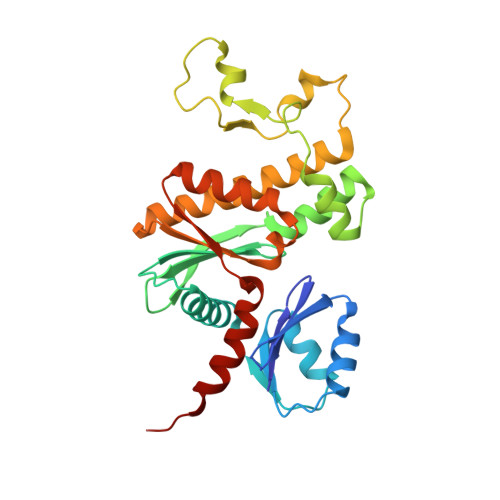Discovery of Potent Pantothenamide Inhibitors of Staphylococcus aureus Pantothenate Kinase through a Minimal SAR Study: Inhibition Is Due to Trapping of the Product.
Hughes, S.J., Barnard, L., Mottaghi, K., Tempel, W., Antoshchenko, T., Hong, B.S., Allali-Hassani, A., Smil, D., Vedadi, M., Strauss, E., Park, H.W.(2016) ACS Infect Dis 2: 627-641
- PubMed: 27759386
- DOI: https://doi.org/10.1021/acsinfecdis.6b00090
- Primary Citation of Related Structures:
4M7X, 4M7Y, 5ELZ, 5JIC - PubMed Abstract:
The potent antistaphylococcal activity of N-substituted pantothenamides (PanAms) has been shown to at least partially be due to the inhibition of Staphylococcus aureus's atypical type II pantothenate kinase (SaPanK II ), the first enzyme of coenzyme A biosynthesis. This mechanism of action follows from SaPanK II having a binding mode for PanAms that is distinct from those of other PanKs. To dissect the molecular interactions responsible for PanAm inhibitory activity, we conducted a mini SAR study in tandem with the cocrystallization of SaPanK II with two classic PanAms (N5-Pan and N7-Pan), culminating in the synthesis and characterization of two new PanAms, N-Pip-PanAm and MeO-N5-PanAm. The cocrystal structures showed that all of the PanAms are phosphorylated by SaPanK II but remain bound at the active site; this occurs primarily through interactions with Tyr240' and Thr172'. Kinetic analysis showed a strong correlation between k cat (slow PanAm turnover) and IC 50 (inhibition of pantothenate phosphorylation) values, suggesting that SaPanK II inhibition occurs via a delay in product release. In-depth analysis of the PanAm-bound structures showed that the capacity for accepting a hydrogen bond from the amide of Thr172' was a stronger determinant for PanAm potency than the capacity to π-stack with Tyr240'. The two new PanAms, N-Pip-PanAm and MeO-N5-PanAm, effectively combine both hydrogen bonding and hydrophobic interactions, resulting in the most potent SaPanK II inhibition described to date. Taken together, our results are consistent with an inhibition mechanism wherein PanAms act as SaPanK II substrates that remain bound upon phosphorylation. The phospho-PanAm-SaPanK II interactions described herein may help future antistaphylococcal drug development.
Organizational Affiliation:
Department of Biochemistry, Stellenbosch University , Stellenbosch 7600, South Africa.

















